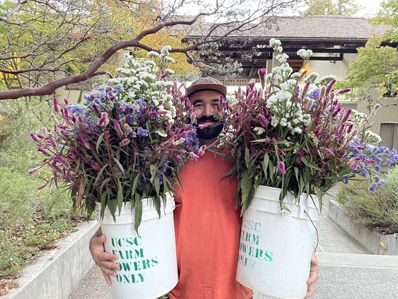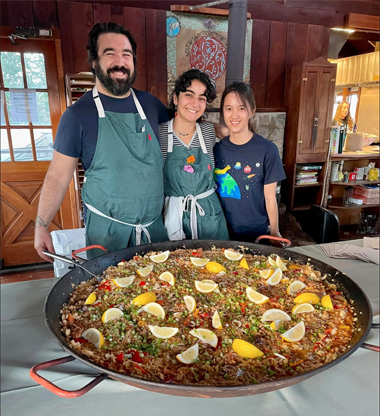Tell us a bit about yourself, your background, and how your path led to where you are today.
I grew up, learning about the world through food, in a family farm to table restaurant in Mendocino County in a little town called Boonville. My Aunt, Uncle and Grandparents ran a biodynamic apple farm and cooking school called the Philo Apple Farm,and I didn’t want to become a chef. Though food was a powerful and important centerpiece of my family life and a source of joy, I also saw the demanding realities of working in food service. Still, I worked as a dishwasher and did events from a very young age and learned a lot by osmosis.
As a UCSC undergraduate, I double majored in Classical Studies and World Literature. I focused my research on ancient fermentation practices and the momentum of Western Civilization through the transmission and evolution of narratives. The pedagogical principles I gained during my studies are the same methods and practices that I use today as a chef.
When I am researching a new foodway, I endeavor to understand the etiology of how and why a dish came into  existence and continued to evolve as its inheritors migrated around the world and evolved and adapted the dish to new food systems. My continued curiosity for connecting food narratives with global history is how I found out that al pastor was invented by Lebanese immigrants in Mexico City, that banh mi is part of a complex legacy of French colonialism; that peppers, tomatoes, eggplant, squash, beans, potatoes, and corn didn’t make their way to Europe until after Columbus invaded the Americas. Imagine Irish cooking without potatoes, Italian food without tomatoes, or France without Ratatouille! The story of humankind can be traced through food, and weaving the mysteries of kitchens with the legacies of ingredients reveals rich stories about our world.
existence and continued to evolve as its inheritors migrated around the world and evolved and adapted the dish to new food systems. My continued curiosity for connecting food narratives with global history is how I found out that al pastor was invented by Lebanese immigrants in Mexico City, that banh mi is part of a complex legacy of French colonialism; that peppers, tomatoes, eggplant, squash, beans, potatoes, and corn didn’t make their way to Europe until after Columbus invaded the Americas. Imagine Irish cooking without potatoes, Italian food without tomatoes, or France without Ratatouille! The story of humankind can be traced through food, and weaving the mysteries of kitchens with the legacies of ingredients reveals rich stories about our world.
During my senior year, I started an apple cider company called Bite Hard Apple Cider. It eventually grew to a 30,000 case a year brand distributed across the country. In the intervening years, I began to find myself back in the kitchen, first in my father’s restaurant once again, and as a private chef. I started a food truck business, called Bruxo Food Truck where I featured “shapeshifting cuisine” out of what we called an “unidentified fooding object”, rotating the menu and highlighting local produce and global stories in food styles from around the world.
The hours were grueling, and I was once again immersed in the harsh realities I had seen as a child. We catered all over California, sometimes preparing up to 15 courses for groups of anywhere from 10-600 people. My average work weeks were well over 90 hours of work to ensure ethical sourcing, delicious recipes and enough operating hours to pay fair wages. I constantly saw the ways in which our Food Systems and service workers are in dire need of more sustainable systems.
Towards the end of 2019, a friend nudged me towards a job at UCSC with a focus on food security, sustainability, and culinary learning. I started this incredible job at the University, working in a non-transactional farm to table cafe, teaching students how to cook, and working alongside people who are also finding ways to build more sustainable food systems. I never looked back!
What does Sustainability mean to you?
In the simplest terms, sustainability to me is the practice of attuning short and long term activities to the betterment of environments. Many human activities are detrimental to the landscapes that are around us, but finding ways to reduce and offset the impact of modern human life to our surrounding environment is vital to the health of our planet.
In the kitchen, this means diverting waste streams by utilizing every part of something, minimizing the use of ingredients that utilize single use packaging, optimizing kitchen operations to mitigate food waste, and, perhaps most importantly, sourcing products that come from growers and producers who self reflect, attune, and optimize their production practices to minimize their carbon footprint.
I believe sustainability is a choice that we all ideally would be able to make. That said, sustainability is an economic privilege. Working both in sustainable food systems and basic needs and food security work is not always congruent. There is a complex relationship between accessibility and sustainability, and I think that the work that we do here at UCSC is helping to push that conversation forward.
Tell us about the Cowell Coffee Shop: what is unique about it and what experiences you have had there that are meaningful to you?
As a non-transactional space that is an extension of the UCSC farm, the Cowell Coffee Shop is singularly unique in my experience. The ability for students to feed one another completely changes traditional relationships in cafes and restaurants between staff and customers, and engenders a sense of community that is very rare.
We have incredible students here at UCSC, and it is my privilege to watch the students that I get to work with grow as human beings and as food producers and community activists. By far the most rewarding part of this work is these incredible people, and seeing them grow as chefs, allies, and leaders.
Additionally, the opportunity to work with our campus ethnic resource centers has been so fulfilling and dynamic. Being able to support the vital work that staff and students are doing by collaborating on menus that represent so

many different culinary diasporas and foodways has been really inspirational. We get to see how important it is for students to be able to express themselves through the stories that the foodways they grew up with tell and to share those dishes and narratives with one another. Cooking at the Dia de los Muertos celebration in November and the Indigefest in April, both at the Quarry amphitheater, was an incredible honor for us, and we love being able to be a part of these amazing events and so many others around campus.
The question I always ask UCSC students is “what would your grandmother cook if she were here right now?” The history of culinary innovation is rooted in communities finding intersections between the cooking practices of their ancestors and the ingredients that are available to them in the new food systems in which they find themselves. Finding new ways to engage with old ingredients, or vice versa old ways to engage with new ingredients is such a complex and rewarding process.
Local food pathways are inherently more sustainable, as there is less fuel expended to transport it, less refrigeration utilized across the supply chain, and easier pathways towards food making it to the plate at its most nutritionally dense. Fresh ingredients undergo nitrogen desiccation over time, which means that the sooner that you eat something from the time that it is harvested, the less of it you need to eat in order to be nourished.
CCS students anchor everything they do in what is coming out of the fields at that time of year. In February, that means we eat a whole lot of cabbage, beets, potatoes, and chard. However, despite that, our students constantly find new and inventive ways to prepare these same ingredients. I am constantly flabbergasted by the brilliance and creativity of our student communities when they are put in positions to imagine.
As the Cowell Coffee Shop supervisor, what are challenges and successes you can speak of?
One of the hardest things to navigate is that as a free cafe, there is not necessarily a tied relationship to our budget and how busy we are. As more and more students find out about our cafe, and more and more people come to visit, our staffing and supplies stay largely the same. This has led to us figuring out some enormously creative ways to stretch, streamline, and optimize the ingredients that we can afford to buy each week.
What I find really interesting is that the answers to the riddles of food security can be found so often in the foodways of cultures whose climates reflect the season that we are in. During the winter quarter, turning to Russia for borscht recipes, and to the Hopi for dry beans, squash, and masa recipes, and Japan and Korea for a phantasmagoria of soup and noodle dishes, yields delicious and dynamic answers to affordably stretching ingredients.
We are continuing to advance development and grant opportunities to sustain our work. Last year, we launched the Foodways Fund, which gives stakeholders in our work the opportunity to donate to our program to help support purchasing more ingredients, upgrading our infrastructure, and underwriting student positions. Last year, we threw a benefit dinner with Alice Waters at the Hay Barn in July. This year, on June 2nd, we will be working with Brandon Jew as part of the Road Map to Food Security efforts.
How about the Center for Agroecology Mobile Food Hub? What is it, how did it come about?
The Mobile Food Hub was funded and built before I arrived here, and was sitting on the farm. Because I had experience running a food trailer, we have been able to operationalize it for events at the quarry and throughout campus.
Long term, we hope to grow our programming and staff infrastructure enough to operate the Mobile Food Hub regularly out of Oakes college. You can see in the design of the food truck that it was intended for Oakes. Elijah Solow-Ohashi, a brilliant artist and student here, actually won a design competition with that wrap design, and subsequently ended up working in the kitchen at the Cowell Coffee Shop. He’s so talented, we’re really going to miss him when he graduates this Spring!
We hope to launch a food hub menu one day that features quarterly rotations of rice and beans recipes from around the world. Almost every culture has some iteration of rice and beans. In the meantime, it is a fantastic way to feed a lot of people when we have to migrate our offerings away from the Cowell Coffee Shop.
Is there anything else about the work you do that you would like to share?
I can’t say enough that our student workers and interns are so amazing, and that we are so lucky to get to work with them. Without them, the cafe wouldn’t be anything.
Lastly, what do you do for fun outside of work?
I cook a lot, garden, read, write, play pickup basketball, ride my bike along the Ohlone bluffs trail, spend time with my wife, explore and hike, and I love to swim and spend time in water. We are expecting our first child in June, and I am so excited to get to spend time with them. I can’t wait to take them up to the Hay Barn field for their first strawberry.
